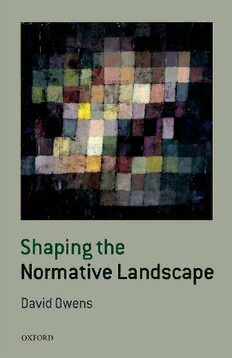
Shaping the Normative Landscape PDF
Preview Shaping the Normative Landscape
Shaping the Normative Landscape This page intentionally left blank Shaping the Normative Landscape DAVID OWENS 1 3 GreatClarendonStreet,Oxford,ox26dp, UnitedKingdom OxfordUniversityPressisadepartmentoftheUniversityofOxford. ItfurtherstheUniversity’sobjectiveofexcellenceinresearch,scholarship, andeducationbypublishingworldwide.Oxfordisaregisteredtrademarkof OxfordUniversityPressintheUKandincertainothercountries #DavidOwens2012 Themoralrightsoftheauthorhavebeenasserted FirstEditionpublishedin2012 Impression:1 Allrightsreserved.Nopartofthispublicationmaybereproduced,storedin aretrievalsystem,ortransmitted,inanyformorbyanymeans,withoutthe priorpermissioninwritingofOxfordUniversityPress,orasexpresslypermitted bylaw,bylicenceorundertermsagreedwiththeappropriatereprographics rightsorganization.Enquiriesconcerningreproductionoutsidethescopeofthe aboveshouldbesenttotheRightsDepartment,OxfordUniversityPress,atthe addressabove Youmustnotcirculatethisworkinanyotherform andyoumustimposethissameconditiononanyacquirer BritishLibraryCataloguinginPublicationData Dataavailable LibraryofCongressCataloginginPublicationData Dataavailable ISBN 978–0–19–969150–0 PrintedinGreatBritainby MPGBooksGroup,BodminandKing’sLynn ForSam Preface Thisbookcontributestoatraditionofthoughtaccordingtowhichfactsaboutwhat peoplehavearightto,orwhatobligationstheyhave,orwhattheyaretobeblamed for,dependonfactsabouthumaninterests.Idepartfrom(ordevelop)thistradition inpostulatingnormativeinterests. Thephrase‘normativeinterest’canbegiveneitherabroadoranarrowconstrual. Onthebroaderconstrualanormativeinterestisanyinterestwithnormativesignifi- cance,anyinterestthataffectsthenormativesituation,anyinterestthatisnormative forus,whichshouldguidehowwethink,feel,andact.Onthenarrowerconstruala normative interest is an interest that takes normative phenomena as its object, an interestinwhichthoughts,feelings,andactionsareobligatory,blameworthy,appro- priate, or even intelligible. I’ll be using ‘normative interest’ in this second sense. In particular,Ishallurgethatawiderangeofnormativephenomenacanbeexplained onlybysupposingthathumanbeingshaveinterestsincontrollingthedistributionof rightsandobligations, theappropriate objectsofblame,etc.,interestsdistinctfrom their non-normative interests. Our interests in the normative are often normative forus. This book is concerned with what I call choice-dependent obligations, a varied category which includes obligations of reciprocation and due care for expectations, obligations implicated in relationships like friendship, obligations which can be abolished by consent, as well as promissory obligations. The book also considers forgiveness.Toexplainthesephenomena,Iconstructanddeployanaccountoftheir value.Thesameapproachmaycastlightonaspectsofoursociallivesthatlieonthe periphery of the present work such as property rights, political authority, positive law,andlinguisticassertion. Myaccountofthesematters differsfrom manyothers inthatitmakesnouse of notions with a special moralized sense. I am thinking of ‘autonomy’, ‘respect’, ‘recognition’, and ‘equality’, as well ‘moral obligation ‘moral value’, ‘moral right’, ‘moralreason’,‘moralprinciple’,andsoforth.Iworrythat(atleastintheirintended sense)thesenotionscannotbeunderstoodindependentlyofthedeonticphenomena we are trying to explain. My own foundational notions—‘interest’, ‘value’, ‘habit’, ‘practice’,‘appropriate’,‘intelligible’,andsoforth—areofverybroadapplicationand so offeranexplanatorypurchaseonthedeontic.Evenacompletescepticaboutthe deonticwouldneedtoemploytheminotherdomains. Tomymindrecentwritingaboutmoralitypresentsuswithafalsedilemma.Some think ‘moral’ norms are to be established by practical reasoning and that our adherencetothemisanexpressionofournatureasfreeandrationalbeings.Within Preface vii this camp there is a lively debate about what constitutes practical reasoning but relatively little discussion of whether morality is generated by practical reasoning. Others insist that ‘moral’ norms are the products of those drives, reflexes, and instincts which enabled us to prevail in the evolutionary struggle, that they express our animal nature. On this view, guilt, blame, and even conscientious agency are moresophisticatedversionsofsomethingthatoccursthroughouttheanimalworld. Perhapsthe rationalist and the naturalist approachare each suited toexplain some aspect of what is generally called morality but I doubt they cover the field. Our normativenicheismouldedbyhabits,customs,andpractices.Thesesocialphenom- enaaretheproductsofrationalchoicesbuttosubscribetoapracticeortoactoutof habitistoactneitheronreasonnoronimpulse. Inthepastdecade,Ihaveacquiredmanydebtstopersonsandinstitutions.Asto thelatter,IowethankstotheUniversityofSheffieldforgrantingmesabbaticalleave in 2001 and again in 2005 and to the Arts and Humanities Research Council for supportingmyworkonbothoccasionsthroughtheirResearchLeaveScheme.Ialso thanktheSchoolofAdvancedStudyintheUniversityofLondonforenablingmeto spend theautumnof2005in Londonasa Visiting Professorial Fellow.During that first phase ofworkImanaged towrite several papersonpromising and obligation. That I was able to turn these papers into this book is down to the Leverhulme Foundationwhoawardedmeatwo-yearMajorResearchFellowshipfor2008–9.Iam deeply grateful for that opportunity. I spent the autumn of 2009 revising the manuscript in Oxford, thanks to the award of a Visiting Fellowship at All Souls College.Thefinalversionofthebookwaspreparedintheautumnof2011duringa term of sabbatical leave from the University of Reading and whilst I was a Visiting FellowattheNewYorkUniversityInstituteofPhilosophy.Iwasalsotherecipientof a British Academy Research Development Award for a project on ‘Telling and Trusting’between2009and2011.Thisawardfinancedanumberofworkshopsthat aidedthedevelopmentoftheseideas. My interest in many of the issues discussed here grew out of a seminar on promissoryobligationrunbyLiamMurphybackin2001.DanielMarkovits,Joseph Raz, Nishi Shah, and David Velleman all played an important role in bringing the projecttocompletion,byreadingdraftsanddiscussingtheissuesaswellsupporting myworkinotherways.JonathanAdler,whodiedwhilstthisbookwasinpress,wasa constantsourceofhelpandencouragement.Iamalsogratefulforthecommentsof Jody Azzouni, Ralph Bader, Chris Bennett, Curtis Bridgeman, Tim Clarke, Jules Coleman, Troy Cross, Veronique Munoz-Darde, Stephen Darwall, Alex Gregory, Matt Evans, Kati Farkas, John Gardner, Zoltan Szabo Gendler, Michael Gibb, Andrew Gold, Pete Graham, Peter Goldie, Leslie Green, Edward Harcourt, Alison Hills,BradHooker,ChrisHookway,RobertHopkins,UlrikeHeuer,MikeHuemer, Shelly Kagan, Francis Kamm, Rosanna Keefe, Gregory Klass, Niko Kolodny, Jody Kraus, Noa Leibowitz, Jimmy Lenman, Michael Martin, Mike Otsuka, Richard viii Preface Parkhill,IanPhillips,TomPink,MichaelPratt,AndrewSimester,JenniferSaul,Tim Scanlon,SamScheffler,SeanaShiffrin,JonathanSmith,MattSmith,NicSouthwood, MichaelStocker,GalenStrawson,SharonStreet,JohnTasioulas,RogerTeichmann, PeterVallentyne,DanielViehoff,GaryWatson,RalphWedgwood,andLeifWenar. IthankOxfordUniversityPressforpermissiontoquotefromHume’sTreatiseon Human Nature, 2nd edn., ed. P. Nidditch. Parts of Chapter3 are taken from ‘Rationalism about Obligation’, European Journal of Philosophy 16(3) (December 2008):403–31.Chapter5isbasedon‘TheProblemwithPromising’,inH.Sheinman (ed.): Understanding Promises: Philosophical Essays (Oxford: Oxford University Press 2011): 58–79. Most of Chapter8 appears as ‘Promising Without Intending’, Journal of Philosophy 105(12) (December 2008): 737–55, and parts of Chapter10 derive from ‘Duress, Deception and the Validity of a Promise’, Mind 116(462) (April2007):293–315.InChapters6and9,Ireproducesectionsof‘ASimpleTheory of Promising’, Philosophical Review 115(1) (January 2006): 51–77, and passages in Chapters 1 and 4 appear in ‘The Value of Duty’, Proceedings of the Aristotelian Society,SupplementaryVolumeLXXVI(July2010).Finally,anabbreviatedversionof Chapter7 was published as ‘The Possibility of Consent’ Ratio 24 (December 2011): 402–21. I am grateful to Sam Ishii-Gonzales for the front cover and for fifteen years of supportandencouragement. Contents Introduction 1 1. Choice-dependentobligations 3 2. Normativeinterests 6 3. Makingsense 12 4. Deonticvalue 17 Part I: Interests 1. BlameandGuilt 25 5. Blameasanger 27 6. Aptnessandaccuracy 31 7. Blamewithoutanger? 34 8. Thescopeofblameandthenatureofguilt 40 2. Wronging 44 9. Wrongsandwrongings 45 10. Wrongingsandforgiveness 51 11. Remissiveinterests 58 12. Wrongingsandinterests 61 3. Obligation 68 13. Thesanctiontheory 70 14. Scanlononwrong 73 15. Policiesandhabits 76 16. Theconscientiousagent 85 17. Blame,exclusion,andconflictsofobligation 89 4. ObligationandInvolvement 96 18. Friendshipandotherformsofinvolvement 97 19. Custom,choice,andinvolvement 100 20. Friendshipandbenefaction 104 21. Involvementsanddeonticinterests 111 22. ConclusiontoPartI 117 Part II: Powers 5. TheProblemwithPromising 123 23. Theproblemofbarewronging 123 24. Theproblemofnormativepower 127
